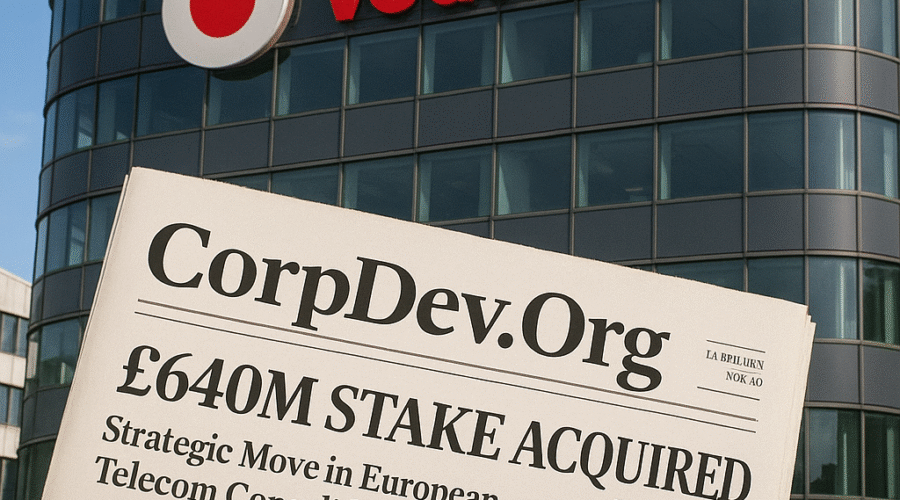Swiss billionaire activist investor Martin Ebner has quietly assembled a commanding £640 million stake in Vodafone Group Plc, positioning himself as one of the telecommunications giant’s largest shareholders with a 3% ownership position. The strategic move, executed through Ebner’s investment vehicle Patinex AG over several years, represents his first major foray into the British corporate landscape and signals potential governance-driven value creation in a sector undergoing rapid transformation.
💼 M&A / PE diligence in 24 hours? Yes, thanks to AI!
Strategic Positioning and Market Timing Analysis
Ebner’s entry into Vodafone comes at a pivotal moment for the telecommunications industry, with the company’s shares having surged 28% in 2025 following regulatory approval of its transformative merger with Three UK[1][14]. The timing reflects sophisticated market positioning, as the Swiss investor crossed the regulatory disclosure threshold precisely as Vodafone emerged from a period of strategic restructuring and operational challenges. His investment methodology demonstrates the calculated approach that has characterized his three-decade career reshaping Swiss corporate governance structures.
The scale of Ebner’s commitment underscores his conviction in Vodafone’s transformation potential. At current valuations, the £640 million investment represents approximately 3% of Vodafone’s outstanding equity, making Patinex one of the company’s most significant shareholders alongside UAE-based e& (formerly Etisalat), which holds the largest stake at 15%[9][11]. This positioning provides Ebner with substantial influence over strategic decisions while maintaining flexibility for potential escalation if governance reforms fail to materialize.
Market analysts view the investment through the lens of Ebner’s historical approach to value creation through operational efficiency and capital allocation discipline. Unlike more aggressive activist campaigns, Ebner’s methodology typically involves sustained engagement with management teams to drive structural improvements rather than confrontational tactics. This approach appears particularly well-suited to Vodafone’s current strategic phase, as the company focuses on integration following the Three UK merger and optimization of its global portfolio.
Ebner’s Activist Legacy and Corporate Transformation Track Record
Martin Ebner’s reputation as Switzerland’s premier corporate activist stems from his transformative campaigns throughout the 1980s and 1990s, when he fundamentally reshaped the Swiss business landscape through targeted investments and governance reforms[6][7]. His most notable achievement involved the eventual merger of Schweizerische Bankgesellschaft (SBG) with Schweizerischer Bankverein in 1998, creating what is now UBS, one of the world’s largest wealth management institutions. This campaign, fought against a 22-member board of directors, demonstrated Ebner’s ability to drive systemic change in large, complex organizations.
The Swiss financier’s approach centered on improving returns on equity through operational efficiency and shareholder-focused capital allocation. During his campaigns at companies including Swiss Re, Roche, ABB, and Lonza Group, Ebner consistently advocated for reduced board sizes, performance-linked executive compensation, and disciplined investment strategies[6][8]. His methodology proved prescient, with most of his reform demands ultimately adopted across Swiss corporate governance practices.
Following a challenging period during the dot-com crash of 2001-2002, when his heavily leveraged BZ Group faced near-bankruptcy, Ebner orchestrated a remarkable financial recovery[7][8]. This experience reinforced his focus on sustainable business models and prudent capital structures, principles that appear directly applicable to Vodafone’s current strategic positioning. His subsequent investments through Patinex have maintained this disciplined approach, with significant stakes in healthcare company Vifor Pharma, software firm Temenos AG, and real estate investor Intershop.
Vodafone’s Strategic Transformation and Operational Challenges
Vodafone’s current strategic position reflects a company in the midst of comprehensive transformation, with the recently completed Three UK merger representing the cornerstone of its portfolio optimization strategy[13][15]. The £16.5 billion transaction creates VodafoneThree, the UK’s largest mobile operator serving 27 million customers, with committed infrastructure investments of £11 billion over the next decade. This scale provides the foundation for challenging established competitors EE (BT Group) and Virgin Media O2 while delivering the operational synergies essential for margin expansion.
The company’s financial performance demonstrates the complexity of its operational landscape. While service revenue growth of 5.2% and EBITDAaL growth of 2.2% in Q3 2025 indicate underlying strength, persistent challenges in Germany continue to weigh on overall performance[16][18]. Germany, contributing over 40% of Vodafone’s EBITDA, has faced regulatory headwinds including the end of bulk TV contracting in multi-dwelling units and antitrust scrutiny over 5G infrastructure deployment. However, management’s cost reduction initiatives, including 3,100 role eliminations, appear to be stabilizing operations.
Vodafone’s strategic reorientation toward high-growth markets demonstrates management’s recognition of changing industry dynamics. The €8 billion sale of Vodafone Italy and focus on African operations, where service revenue surged 11.6% organically in Q3 FY25, reflects a portfolio approach prioritizing markets with sustainable competitive advantages[18]. Africa now accounts for nearly 30% of group service revenue, with South Africa’s M-Pesa expansion and Egypt’s data growth providing significant momentum.
Competitive Landscape and Industry Consolidation Trends
Ebner’s investment occurs within a broader context of European telecommunications consolidation, as operators seek scale advantages necessary to compete with global technology platforms and fund 5G infrastructure deployment. The sector faces mounting pressure from regulatory requirements for network investment, increasing competition from over-the-top services, and the need for operational efficiency to maintain profitability. These dynamics create opportunities for activist investors to drive value through strategic focus and operational improvements.
Vodafone’s competitive position benefits from its diversified geographic footprint and leading market positions in key regions. The company serves over 340 million customers across mobile and fixed services, operates one of the world’s largest IoT platforms, and maintains partnerships with mobile networks in over 40 additional markets[3]. This scale provides negotiating power with suppliers and technology partners while offering opportunities for cross-selling and service bundling across customer segments.
Previous activist involvement in Vodafone’s governance provides context for Ebner’s potential influence. Cevian Capital, one of Europe’s largest activist investors, previously held a stake focused on driving consolidation in weaker markets including Spain, Italy, and the UK[4]. French investor Xavier Niel criticized the company as “too fat, too slow, too complex” while advocating for asset sales to improve financial flexibility[2]. These precedents suggest receptivity to governance-focused value creation strategies.
Financial Engineering and Capital Allocation Implications
Vodafone’s current financial structure provides multiple avenues for value creation through improved capital allocation discipline. The company maintains adjusted EBITDA guidance of €11.0-11.3 billion, supported by lower European energy costs providing €200 million in annual benefits and continued momentum in African operations[18]. Adjusted free cash flow guidance of at least €2.4 billion demonstrates the company’s ability to fund growth investments while returning capital to shareholders.
The company’s ongoing €2 billion share buyback program, with €1.5 billion already executed, signals management confidence in the transformation strategy while providing immediate shareholder returns[3][18]. This capital discipline reflects lessons learned from previous periods of aggressive expansion that strained the balance sheet. Ebner’s presence may accelerate decisions regarding optimal capital structure and dividend sustainability given his track record of advocating for shareholder-focused policies.
Valuation metrics suggest potential for activist-driven value creation. Vodafone trades at an EV/EBITDA multiple of approximately 5.0x, significantly below peers including Orange at 6.8x and Deutsche Telekom at 7.3x[18]. This discount may reflect market skepticism regarding execution of the transformation strategy, creating opportunities for governance reforms to unlock valuation premiums through improved operational performance and strategic clarity.
Risk Assessment and Regulatory Considerations
Ebner’s investment faces several potential challenges that could limit the effectiveness of traditional activist strategies. The UK telecommunications sector operates under extensive regulatory oversight, with Ofcom maintaining significant influence over pricing, service quality, and competitive dynamics. The recently completed Three UK merger required substantial regulatory concessions, including three-year price caps and wholesale access commitments that may constrain operational flexibility[12][15].
Vodafone’s complex ownership structure, with significant stakes held by international investors including UAE-based e&, may dilute individual shareholder influence compared to Ebner’s previous campaigns in Switzerland’s more concentrated ownership environment[9][11]. The company’s geographic diversification across European and African markets also presents coordination challenges for comprehensive governance reforms, requiring nuanced approaches tailored to local regulatory and competitive conditions.
Market conditions present additional risks to activist value creation strategies. Rising interest rates and inflationary pressures could constrain telecommunications valuations while increasing the cost of capital for infrastructure investments. The sector’s capital-intensive nature requires sustained investment in 5G deployment and network modernization, potentially limiting flexibility for alternative capital allocation strategies including increased dividends or share buybacks.
Strategic Implications for Telecom Sector Governance
Ebner’s Vodafone investment represents a broader trend toward activist engagement in European telecommunications, as investors seek to unlock value in a sector characterized by significant assets but challenged by technological disruption and regulatory complexity. His presence may catalyze similar investments in other regional operators facing comparable strategic challenges, particularly as consolidation opportunities become increasingly scarce due to regulatory restrictions.
The investment timing coincides with critical strategic decisions regarding Vodafone’s future portfolio composition and operational priorities. Management faces choices regarding further geographic rationalization, technology partnerships, and infrastructure sharing arrangements that could significantly impact long-term competitive positioning. Ebner’s influence may accelerate decision-making processes while ensuring shareholder interests receive appropriate consideration in strategic planning.
Board composition and governance structures present immediate opportunities for activist influence. Vodafone’s current board includes 13 directors with diverse backgrounds spanning telecommunications, technology, and financial services[10]. Ebner’s track record of advocating for board size optimization and industry-specific expertise may drive governance improvements that enhance strategic oversight and operational accountability.
Investment Thesis and Market Outlook
The convergence of Ebner’s activist investment with Vodafone’s strategic transformation creates compelling dynamics for value creation across multiple dimensions. His historical success in driving operational efficiency improvements aligns with the company’s current needs for cost optimization and portfolio focus following the Three UK merger integration. The investment scale provides sufficient influence to drive governance improvements while maintaining flexibility for strategic alternatives if initial reforms prove insufficient.
Market conditions support the activist investment thesis despite near-term challenges. Vodafone’s shares have demonstrated strong momentum with 28% gains in 2025, reflecting growing investor confidence in the transformation strategy[1][14]. The company’s focus on high-growth African markets and operational efficiency improvements in European operations provides multiple avenues for sustained performance enhancement under activist oversight.
Long-term industry trends favor large-scale operators with strong governance structures and disciplined capital allocation. The increasing importance of 5G infrastructure, IoT connectivity, and digital services requires sustained investment and operational excellence that activist oversight may facilitate. Ebner’s presence signals institutional investor confidence in Vodafone’s strategic direction while providing governance mechanisms to ensure execution accountability.
Conclusion and Strategic Recommendations
Martin Ebner’s £640 million investment in Vodafone represents a calculated bet on governance-driven value creation in European telecommunications at a critical industry inflection point. His proven ability to drive operational improvements through sustained shareholder engagement aligns with Vodafone’s transformation needs while providing market validation for the company’s strategic direction. The investment timing, coinciding with the Three UK merger completion and operational stabilization in key markets, maximizes potential for activist influence on strategic outcomes.
For institutional investors and market participants, Ebner’s presence signals potential catalysts for accelerated value creation through improved capital allocation, operational efficiency, and strategic focus. His track record suggests preference for collaborative engagement over confrontational tactics, potentially facilitating productive dialogue with management regarding portfolio optimization and governance improvements. The scale of his commitment demonstrates conviction in Vodafone’s transformation potential while providing sufficient influence to drive meaningful change.
Market dynamics support the activist investment thesis through industry consolidation trends, regulatory stability following recent merger approvals, and improving operational metrics across Vodafone’s core markets. However, successful value creation will require careful navigation of regulatory constraints, complex ownership structures, and competitive pressures that distinguish telecommunication
Sources
https://www.ainvest.com/news/activist-investor-influence-vodafone-assessing-martin-ebner-640m-stake-strategic-implications-2508/, https://www.cityam.com/vodafone-has-grown-too-fat-warns-french-activist-investor/, https://reports.investors.vodafone.com/view/897876789, https://www.cityam.com/vodafone-feels-the-pressure-after-activist-investor-cevian-builds-a-stake/, https://www.indexbox.io/blog/martin-ebner-builds-640m-stake-in-vodafone/, https://www.undervalued-shares.com/weekly-dispatches/the-worlds-best-investors-part-3-martin-ebner-switzerlands-shareholder-value-pioneer/, https://www.finews.com/news/english-news/51845-swiss-financier-bz-bank-martin-ebner-shareholder-value, https://en.wikipedia.org/wiki/Martin_Ebner, https://w.media/e-increases-stake-in-vodafone-group-to-13/, https://www.vodafone.com/about-vodafone/who-we-are/leadership/board-of-directors, https://www.datacenterdynamics.com/en/news/uae-telco-e-increases-vodafone-stake-to-15/, https://www.gov.uk/guidance/how-we-are-investigating-the-vodafonethree-potential-merger, https://www.ig.com/en/news-and-trade-ideas/vodafone-three-merger--what-next-after-the-creation-of-the-uk-s--250611, https://www.ainvest.com/news/vodafone-shares-rise-28-2025-opportunity-2508/, https://globallawexperts.com/mega-merger-win-vodafone-and-three-take-bold-steps/, https://monexa.ai/blog/vodafone-group-s-strategy-q3-earnings-three-uk-mer-VOD-2025-02-18, https://www.telegraph.co.uk/business/2025/08/27/feared-activist-investor-builds-640m-stake-in-vodafone/, https://www.ainvest.com/news/vodafone-german-turnaround-strategic-shift-telecom-growth-story-recovery-2505/





